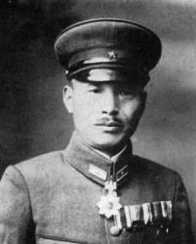Tomitarō Horii
| Tomitarō Horii | |
|---|---|
 Rikugun Shōshō Tomitarō Horii | |
| Born |
November 7, 1890 Hyōgo prefecture, Japan |
| Died |
November 23, 1942 (aged 52) New Guinea |
| Allegiance | Empire of Japan |
| Service/branch |
|
| Years of service | 1911–1942 |
| Rank | Lieutenant General |
| Commands held | 55th Infantry Division |
| Battles/wars |
Second Sino-Japanese War World War II |
Tomitarō Horii (堀井 富太郎 Horii Tomitarō, November 7, 1890 – November 23, 1942) was a lieutenant general in the Imperial Japanese Army during World War II.
Biography
Born in Hyōgo Prefecture, Horii became an infantry officer following his graduation from the 23rd class of the Imperial Japanese Army Academy in 1911.[1] He was later assigned to the headquarters of the Shanghai Expeditionary Army during the January 28 Incident from January 28 – March 4, 1932.[2]
From 1935–1937, he was attached to the IJA 12th Infantry Regiment. He became commander of the IJA 78th Infantry Regiment in 1938, after his promotion to colonel the previous year. Horii was appointed commander of the IJA 55th Division, part of the South Seas Force, in 1941. Horii led this organization in the Japanese invasion and subsequent captured of Guam during December 8-10, 1941.
During the New Guinea campaign, Horii and his South Seas Detachment were assigned to the invasion of Port Moresby, but were turned back by Allied forces during the Battle of the Coral Sea. As a result, after landing in the Buna–Garara area in July 1942, Horii led a column of 8,500 men of the IJA 144th Regiment overland on the Kokoda Trail over the treacherous Owen Stanley mountain range in an attempt to capture Port Moresby.[3] However, after heavy fighting against a small Australian Army and Militia force, the Japanese were delayed and defeated, and Horii was forced to withdraw with his surviving soldiers in the Kokoda Track campaign from September 1942. Horii drowned while crossing the Kumusi River when his raft capsized on November 1942 in Territory of New Guinea.[4]
References
Bibliography
- Dupuy, Trevor N. (1992). Encyclopedia of Military Biography. London: I B Tauris & Co Ltd. ISBN 1-85043-569-3. OCLC 59974268.
- Gamble, Bruce (2001). Darkest Hour: The True Story of Lark Force at Rabaul – Australia's Worst Military Disaster of World War II. St. Paul, MN: Zenith Press. ISBN 0-7603-2349-6. OCLC 71288724.
- Hayashi, Saburō (1959). Kogun: The Japanese Army in the Pacific War. Quantico, VA: Marine Corps. Association. OCLC 1133179.
External links
- Ammenthorp, Steen. "Horii, Tomitaro". The Generals of World War II.
- Chen, Peter. "Horii, Tomitaro". WW2 Database.
| Government offices | ||
|---|---|---|
| Preceded by Walter McNicoll as Administrator of New Guinea |
Commander of Occupied New Guinea 1942 |
Succeeded by Hyakutake Seikichi |